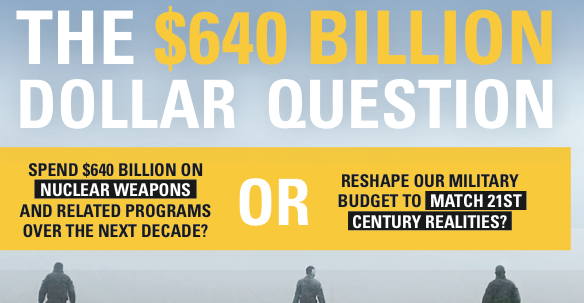640BillionQuestion.png
Whether or not the nation zooms over the fiscal cliff, the Pentagon’s budget is going to get tighter. This may be a challenge for some. But it’s also an opportunity for the Pentagon to shift away from Cold War weapons and reshape the U.S. military to deal with 21st century realities.
It comes down to a simple question: Should the U.S. put its money toward a Cold War nuclear strategy? Or should those funds be spent to equip the military to address 21st century realities?
That is the subject of a new ad that Ploughshares Fund is running today in Politico:
The U.S. is on track to spend $640 billion [3] on nuclear weapons and related programs over the next ten years, according to a recent Ploughshares Fund analysis. In a zero-sum budget environment, every dollar spent maintaining nuclear weapons is a dollar not spent supporting our troops in the field.
Bipartisan experts agree that the United States can meet its security needs with fewer nuclear weapons. A recent report from Global Zero [4], chaired by Gen. James Cartwright, said the U.S. can meet its security needs with an arsenal of 900 nuclear warheads total - a fraction of today's arsenal.
Keeping a large stockpile of nuclear weapons is taxing on security budgets. For that reason, as former Secretary of State Colin Powell once said, “There is no incentive to keep more than you need for the security of the nation.”
If we need fewer nuclear weapons and they are expensive more than security budgets can manage, why not cut them and pocket billions in savings?
That logic is gaining traction in Washington. Walter Pincus at The Washington Post says that making significant arsenal reductions and eliminating one leg of the nuclear triad could save up to $100 billion [5] over the next ten years.
Such cuts could help address two pressing needs: getting rid of the dangerous excesses of the Cold War and keeping the U.S. from going over the fiscal cliff.

